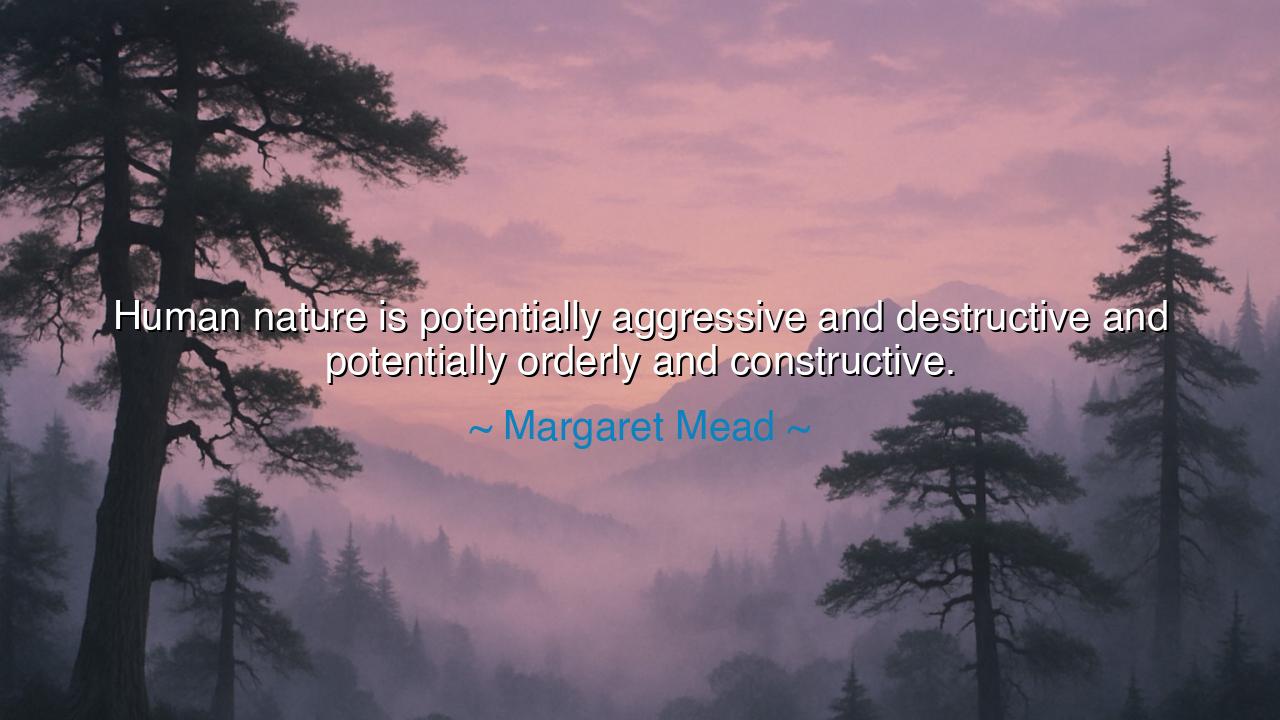
Human nature is potentially aggressive and destructive and
Human nature is potentially aggressive and destructive and potentially orderly and constructive.






Hear now the wisdom of Margaret Mead, who declared: “Human nature is potentially aggressive and destructive and potentially orderly and constructive.” In this saying, she unveils the eternal duality within mankind. For within the same heart lies both the fire that burns cities to ash and the light that builds temples of stone and spirit. Humanity is not bound to one destiny—it is suspended between these two poles, forever choosing, forever shaping the world by which of its natures it allows to rule.
This truth has been known since the dawn of civilization. The ancients told it in stories of gods and heroes: in Prometheus, who stole fire to give to man—fire that could warm the hearth or raze the fields; in Cain and Abel, where one brother raised his hand in murder while the other offered devotion. These are not just myths but mirrors of Mead’s insight: that humanity carries within it both aggression and destruction and, at the same time, order and construction. What we become is determined not by fate but by choice.
History too bears witness. Consider the age of the Second World War. In that time, human beings unleashed horrors of unimaginable cruelty—cities bombed into rubble, innocents slaughtered, hatred made into law. Yet, from the same humanity arose acts of courage and sacrifice: soldiers who gave their lives to resist tyranny, citizens who hid the persecuted at the cost of their own safety, nations that rebuilt from ruins with new hopes of peace. The same species that destroyed also rebuilt, proving Mead’s vision true: both destruction and creation dwell within us.
The meaning of her words, then, is this: human nature is not fixed, but a spectrum of possibilities. To say man is evil by nature is false; to say man is good by nature is equally false. Man is both. The seeds of cruelty and compassion lie side by side in the soil of the soul. It is circumstance, guidance, and above all, conscious choice that water one seed over the other. Thus, every human life is a battleground, and every society is a reflection of how its people manage these two forces.
This is why the ancients insisted on discipline, wisdom, and law. Without order, aggression runs wild and brings ruin. But without courage, even order can wither into cowardice and stagnation. To be fully human is not to extinguish aggression, but to harness it, directing its fire toward noble causes: the defense of the weak, the pursuit of justice, the building of what endures. For passion without order is chaos, and order without passion is lifeless.
What lesson, then, must we take from Mead’s words? It is this: each day, you must choose which nature you will feed. When anger rises, will you let it strike in cruelty, or will you shape it into righteous action? When ambition burns, will you let it consume others, or will you channel it to create, to serve, to uplift? The choice is not abstract—it is in every word you speak, every deed you do, every path you walk. Your nature bends toward the destructive or the constructive depending on how you wield your will.
So I say to you, O child of two natures: remember Mead’s wisdom. Do not despise your aggression, but master it. Do not trust blindly in your orderliness, but enliven it with passion. Strive always to be the builder, not the destroyer; the healer, not the wounder. For in you lives both ruin and renewal, shadow and light. And in every moment of choice, you declare to the world who you are, and what kind of humanity you are helping to shape. This is the sacred burden and the eternal glory of humankind.






AAdministratorAdministrator
Welcome, honored guests. Please leave a comment, we will respond soon